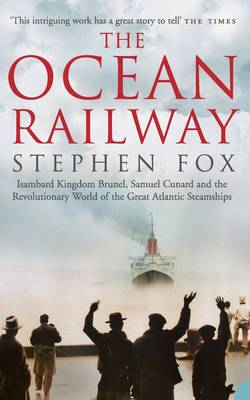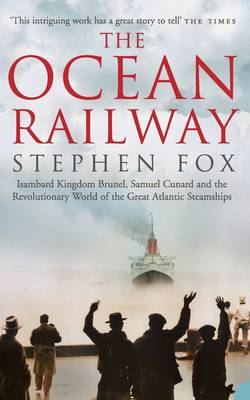
- Afhalen na 1 uur in een winkel met voorraad
- Gratis thuislevering in België vanaf € 30
- Ruim aanbod met 7 miljoen producten
- Afhalen na 1 uur in een winkel met voorraad
- Gratis thuislevering in België vanaf € 30
- Ruim aanbod met 7 miljoen producten
The Ocean Railway
Isambard Kingdom Brunel, Samuel Cunard and the Revolutionary World of the Great Atlantic Steamships
Stephen FoxOmschrijving
An epic social history of steamship travel from the 19th-century to the 'Lusitania', the 'Mauretania' and the 'Titanic'.
The great transatlantic steamships became emblems of an age, of a Victorian audacity of spirit-cathedrals to man's harnessing of new technology. Through the innovations and designs of key engineers and shipping magnates - Samuel Cunard, Isambard Kingdom Brunel and Edward Knights Collins - 'the largest movable objects in human history' were created. To the wealthy, steamships represented glamorous travel, but to most they offered cheap passage out of Europe to the New World. At their peak, steamships delivered one million new Americans each year, transforming the world's oceans from barriers into highways.
In this fascinating history, Stephen Fox chronicles the tragedies that marked the evolution of the ocean liner, including the 1852 sinking of the 'Arctic', with the loss of three hundred and twenty-two lives, and the early 20th-century losses of the 'Lusitania' and the 'Titanic'. Using contemporary records, diaries and writing, he penetrates the experience of transatlantic passage and examines the societies created on the vast floating cities, 'a kind of third human environment, neither land nor sea but partaking of each, and bridging them in unprecedented ways'.
Specificaties
Betrokkenen
- Auteur(s):
- Uitgeverij:
Inhoud
- Aantal bladzijden:
- 560
- Taal:
- Engels
Eigenschappen
- Productcode (EAN):
- 9780006532163
- Verschijningsdatum:
- 20/09/2004
- Uitvoering:
- Paperback
- Formaat:
- Trade paperback (VS)
- Afmetingen:
- 127 mm x 203 mm
- Gewicht:
- 495 g

Alleen bij Standaard Boekhandel
Beoordelingen
We publiceren alleen reviews die voldoen aan de voorwaarden voor reviews. Bekijk onze voorwaarden voor reviews.











